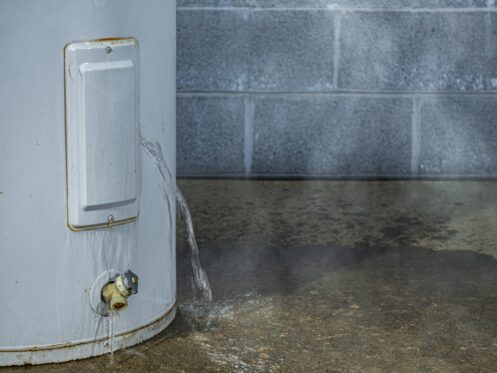Plumbing emergencies rarely give you time to prepare, which is why it helps to know what you’re dealing with before one hits. You can’t prevent every emergency, but you can be ready to handle one. Let’s go over some of the most common plumbing emergencies you might see.
Burst Pipe Blues
A pipe that suddenly breaks can turn your home upside down. The moment you see water spraying or flowing unexpectedly, shut off the main valve quickly. After stopping the flow, mop up water to reduce damage and protect your floors or belongings. Once things calm down, call in professionals. They’ll inspect the break, cut out damaged sections, and install new piping that fits current standards.
Don’t wait, since hidden runoff inside walls or below floors can undermine framing or promote microbial growth. Quick action helps preserve your home structure and keeps costs from climbing. Plus, a skilled plumber can trace root causes such as freeze damage, shifting soil, or worn connections and take steps to prevent repeats.
Overflowing Toilets
When your toilet floods, you need to act quickly to prevent water damage. First, shut the water supply at the valve by the bowl. That halts flooding and gives you space to work. Next, try plunging to break up the clog.
If a plunger doesn’t move the blockage, it’s time to call in the experts. Plumbers bring tools like snakes or augers that can reach deeper into the drain, clear the clog, and check for potential pipe cracks.
Stepping in early keeps leaks from soaking the surrounding plywood or weakening floor joists. Once the blockage clears, your plumber will test the wax ring seal and tighten the flange bolts. Solving a submerged toilet early means you avoid more damage and bathroom repairs later, so don’t wait for overflow to be the only wake‑up call.
Backed-Up Sink or Shower
Bathtubs and sinks that drain slowly or not at all signal problems that need immediate attention. Hair, soap residue, or food debris can jam traps and clog pipes. If water pools around your feet, don’t ignore it.
Instead, try a hand plunger or remove the trap under the sink to clean it out manually. If the clog is deeper, calling in a plumber is a better move than using chemical cleaners, which can damage old pipes.
Pros use rooter machines and video inspection to pinpoint the location and severity of the blockage. Once they clear the debris, they wash out the lines so the drains flow freely again. They can also inspect the vent stack for blockages, such as bird nests or leaf buildup, and clean it out to ensure water drains correctly.
Water Heater Shutdown
No hot water can make a normal day feel like a problem. If your water heater clicks without heating or leaks around the base, switch off its power or gas supply immediately. Carbide panels that aren’t working need a plumber’s diagnostic.
They check heating elements or heating tubes, reset controls, and replace worn valves. If your unit is more than ten years old, a full replacement makes sense since it will restore capacity and efficiency.
A failing water heater can leak slowly and raise utility bills. You may spot puddles or rust near the tank or hear odd rumbling as sediment burns on heating elements. Servicing the system early can add years to its service life and reduce energy use. A new system delivers reliable showers and consistent water at the temperature you expect.
Sudden Loss of Water Pressure
If water pressure dips in all faucets, that’s a call for attention. Closed valves, scavenged municipal water flow, or pressure regulator failure might be at fault. Start by finding the main shut‑off and opening it all the way to clear obstructions.
If pressure stays low, call in someone who can check the regulator or pressure tank. If your system uses well water, a plumber will inspect pressure switches, tanks, and pump configuration.
They may need to replace the switch or tank bladder so that the pressure returns. Weak water flow stresses faucets and washing machines and raises wear on the kettle, dishwasher, and filter systems. Fixing pressure restores convenience and protects appliances. Make that phone call before the low pressure turns into a major flow breakdown or leads to appliance failure.
Gas Line Concern or Strong Gas Smell
If your home uses gas as fuel, smelling gas near a line or hearing a faint hissing noise means your safety is at risk.
Since your service depends on natural or propane gas, shut the supply at the meter or tank immediately and get everyone away from the area. Don’t use matches or flip any switches, and don’t run water from kitchen or bathroom fixtures.
Call emergency services if the odor persists until a professional arrives. Plumbers or gas line specialists use gas detectors and pressure pumps to identify leaks and correct fittings. They’ll check regulators and pipe joints before giving you the OK to restore the supply.
It takes steady, careful work, and no DIY approach is safe here. Getting professionals in fast helps you avoid an accident and gives you confidence that your system is safe to use again.
Water Leaks Behind Walls or Under Floors
You might spot water on the floor, but the source lies hidden behind tiles or drywall. When you suspect a leak, get your hands wet immediately. Feel around baseboards, look for soft spots, or listen for dripping sounds inside walls or under a floorboard.
That leak may stem from a worn-out joint, a cracked pipe, or corrosion buildup, especially near plumbing fixtures like sinks or toilets. Once you notice a sign, shut off the water to that area at the nearest valve or use your main water shutoff. That stops water migration into framing or floor substrates.
Calling an expert early saves you from needing drywall replacement or structural repairs later. Pros use moisture meters and inspection cameras to trace the leak’s path and pinpoint the source without tearing down walls. When they repair the pipe, you get a stable fix and can patch the wall with minimal disruption.
Sewer Line Backup and Sewage Smell
If you smell foul sewage from a drain or notice slow combinations of multiple fixtures, your main sewer line might be blocked. Backups often bring raw sewage into drains or toilets when more fixtures are used simultaneously. Do not ignore such odors; they point to an unhappy sewer line. Instead, stop using your plumbing except in cases of necessity. Call sewer and drain cleaning specialists immediately.
Plumbers use video inspection tools to track the blockage location and examine pipe integrity. They may have to use large-diameter rooters or even hydrojetting to push out sludge, tree roots, or accumulated paper debris. Once the line clears, they may help you install a backflow prevention valve to keep sewage from revisiting. That upgrade avoids repeated backups, keeps your home sanitary, and protects against health concerns.
Handle Your Plumbing Emergencies with Help Now
When something goes wrong with your plumbing, the best thing you can do is take quick, informed steps to protect your home. If you ever feel unsure or the problem gets out of hand, don’t hesitate. We also offer whole-house water filtration system installations, reverse osmosis setups, and slab leak detection services.
Call AJ Danboise Plumbing, Heating, Cooling & Electrical for expert help, day or night.


